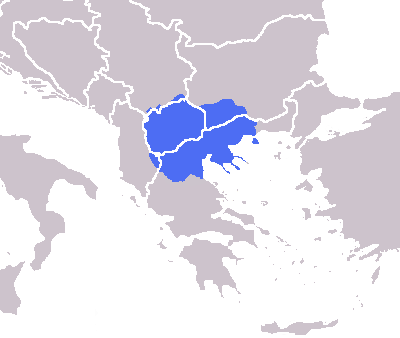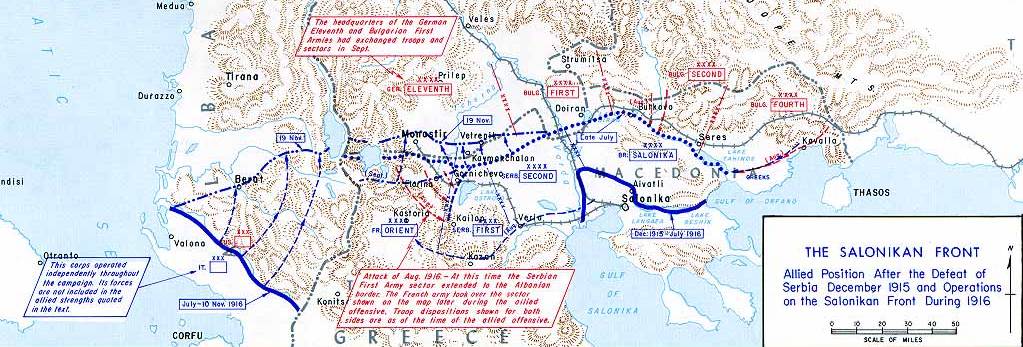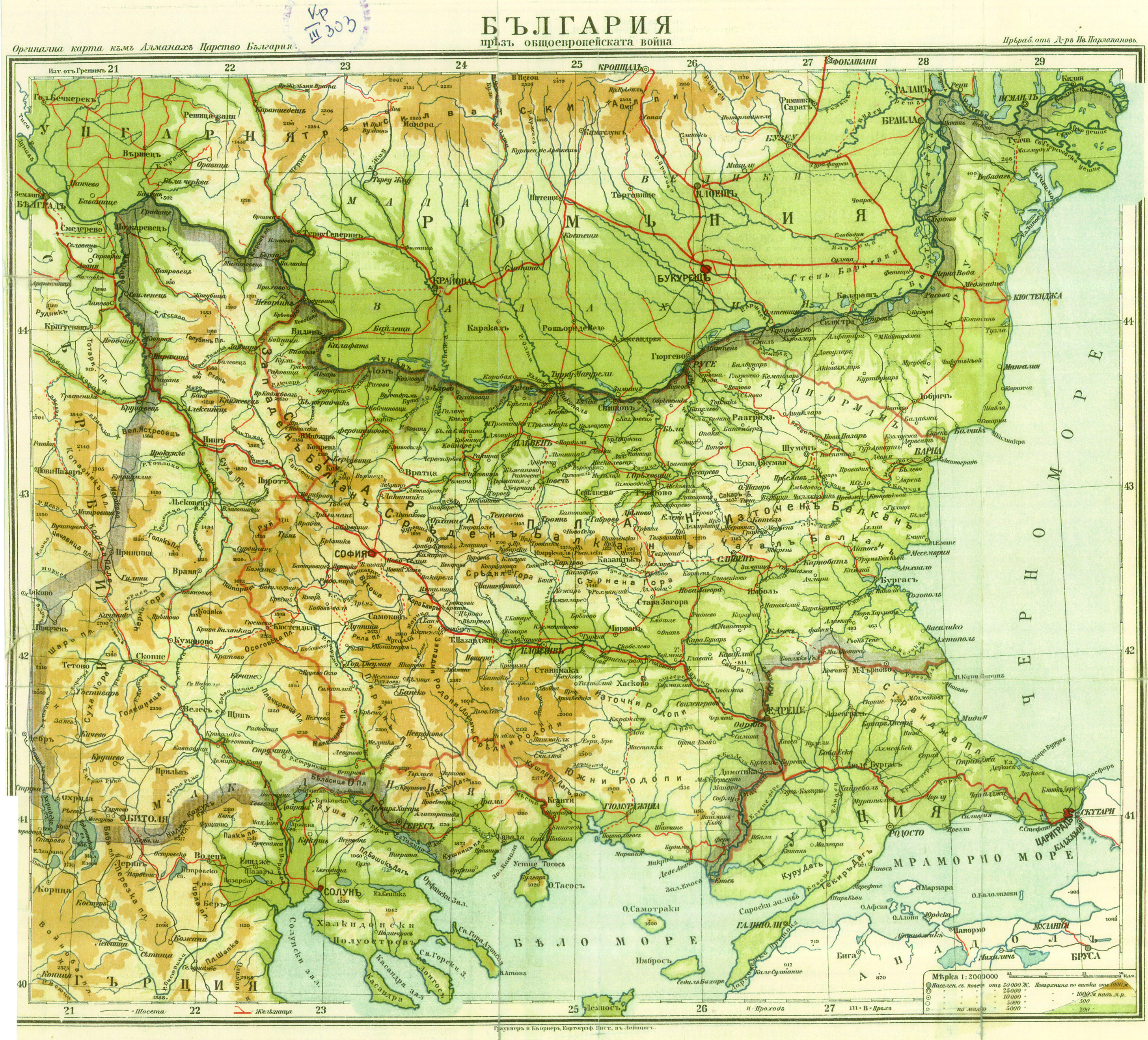|
Ostrovo Unit
The Ostrovo Unit was a Field hospital unit with Transport Coloumn of the Scottish Women's Hospitals. It comprised approximately 200 tents and was situated near Lake Ostrovo, Macedonia during the First World War under the command of the Serbian Army. It was often called The America Unit as the money to fund it came from America and except for a few dressing stations, it was the Allied hospital nearest the front. Beginnings The unit opened in September 1916 soon after the Battle of Malka Nidzhe (Gornichevo ridge). Gornichevo ridge formed the twin summits of Kaimaktsalan, 7,700 and 8,200 feet above sea level. This ridge had to be captured before Monastir ( Bitola on modern British maps) could be re-taken. The first Chief Medical Officer, an Australian, Dr Agnes Elizabeth Lloyd Bennett recorded on the first day that they took 24 cases: "all terribly bad wounds - abdominal, chest, head and compound fractures". On 25 September she wrote: "We now have 160 cases, all bad and it is ter ... [...More Info...] [...Related Items...] OR: [Wikipedia] [Google] [Baidu] |
Ostrovo Unit - Scottish Women's Hospital
Ostrovo may refer to: *Arnissa, a town in Greece formerly called Ostrovo * Ostrovo, Croatia, a village near Markušica, Vukovar-Syrmia County, Croatia *Ostrovo, Veliko Gradište, a village in Serbia *Ostrovo, Požarevac, a village in Serbia *Ostrovo (island), a river island in Serbia *Ostrovo, Bulgaria, a village in Razgrad Province, Bulgaria *Ostrovo (Skopje), a part of Skopje, Macedonia * Lake Ostrovo or Lake Vergoritis in Macedonia, northern Greece {{geodis ... [...More Info...] [...Related Items...] OR: [Wikipedia] [Google] [Baidu] |
Edith Anne Stoney
Edith Anne Stoney (6 January 1869 – 25 June 1938) was a physicist born in Dublin in an old-established Anglo-Irish scientific family. She is considered to be the first woman medical physics, medical physicist. Early life and family Edith Stoney was born at 40 Wellington Road, Ballsbridge, Dublin; the daughter of George Johnstone Stoney, Fellow of the Royal Society, FRS, an eminent physicist who coined the term electron in 1891 as the ‘fundamental unit quantity of electricity’, and his wife and cousin, Margaret Sophia Stoney. One of her two brothers, George Gerald, was an engineer and a Fellow of the Royal Society, Fellow of the Royal Society (FRS). One of her two sisters, Florence Stoney, was a radiologist and received an OBE. Her cousin was the Dublin-based physicist George Francis FitzGerald FRS (1851–1901), and her uncle Bindon Blood Stoney FRS was Engineer of Dublin Port, renowned for building a number of the main Dublin bridges, and developing the Quayside. Edith ... [...More Info...] [...Related Items...] OR: [Wikipedia] [Google] [Baidu] |
Vardar Macedonia (1912–1918)
Vardar Macedonia ( Macedonian and sr, Вардарска Македонија, ''Vardarska Makedonija'') was the name given to the territory of the Kingdom of Serbia (1912–1918) and Kingdom of Yugoslavia (1918–1941) roughly corresponding to today's North Macedonia. It covers the northwestern part of geographical Macedonia, whose modern borders came to be defined by the mid-19th century. History Vardar Macedonia usually refers to the central part of the region of Macedonia attributed to the Kingdom of Serbia by the Treaty of Bucharest (1913) after the Balkan Wars. The territory is named after the Vardar, the major river that cuts across the region from northwest to southeast, to distinguish it from both Greek Macedonia and the region around the Pirin Mountain in Bulgaria. The region was initially known as ''Serbian Macedonia'' although the use of the name ''Macedonia'' was prohibited later in the Kingdom of Yugoslavia, due to the implemented policy of Serbianisation of the ... [...More Info...] [...Related Items...] OR: [Wikipedia] [Google] [Baidu] |
Serbia In World War I
The Serbian campaign was a series of military expeditions launched in 1914 and 1915 by the Central Powers against the Kingdom of Serbia during the First World War. The first campaign began after Austria-Hungary declared war on Serbia on 28 July 1914. The campaign to "punish" Serbia was under the command of Austrian Oskar Potiorek. It ended after three unsuccessful Austro-Hungarian invasion attempts were repelled by the Serbians and their Montenegrin allies. The victory of the Serbian Army at the battle of Cer is considered the first Allied victory in World War I, while the defeat of the Austro-Hungarian Army by Serbia has been called one of the great upsets of modern military history. The second campaign was launched, under German command, almost a year later, on 6 October 1915, when Bulgarian, Austro-Hungarian, and German forces, led by Field Marshal August von Mackensen, successfully invaded Serbia from three sides, pre-empting an Allied advance from Salonica to help S ... [...More Info...] [...Related Items...] OR: [Wikipedia] [Google] [Baidu] |
Modern History Of Greek Macedonia
In the 19th century, the national revival in the Balkans began; national and religious antagonism flared, and conflict was heightened by the Ottoman policy of playing one group against the other. Meanwhile, the Ottoman Empire lost control over the major sections of Greece, Serbia, and Bulgaria, each of which claimed Macedonia on historical or ethnical grounds. In the Treaty of San Stefano (1878), which terminated the Russo-Turkish War of 1877–78, Bulgaria was awarded much of Macedonia. However, the settlement was nullified by the European powers in the same year (see Congress of Berlin), and Macedonia was left under direct Ottoman control. After the Greco-Turkish war of 1897, which proved a disaster for Greece, Bulgarian nationalism started strengthening in Macedonia. On the feast day (20 July) of the prophet Elijah in 1903 there was an uprising, known as the Ilinden Uprising, which the Ottoman army soon suppressed. Greek Struggle for Macedonia The rising, however, made ... [...More Info...] [...Related Items...] OR: [Wikipedia] [Google] [Baidu] |
Greece In World War I
At the outbreak of World War I in August 1914, the Kingdom of Greece remained neutral. Nonetheless, in October 1914, Greek forces once more occupied Northern Epirus, from where they had retreated after the end of the Balkan Wars. The disagreement between King Constantine, who favoured neutrality, and the pro-Allied Prime Minister Eleftherios Venizelos led to the National Schism, the division of the state between two rival governments. Finally, Greece united and joined the Allies in the summer of 1917. Background Greece had emerged victorious from the 1912–1913 Balkan Wars with her territory almost doubled, but found herself in a difficult international situation. The status of the Greek-occupied eastern Aegean islands was left undetermined and the Ottoman Empire continued to claim them, leading to a naval arms race and mass expulsions of ethnic Greeks from Anatolia. In the north, Bulgaria, defeated in the Second Balkan War, harbored plans for revenge against Greece and ... [...More Info...] [...Related Items...] OR: [Wikipedia] [Google] [Baidu] |
Campaigns And Theatres Of World War I
Campaign or The Campaign may refer to: Types of campaigns * Campaign, in agriculture, the period during which sugar beets are harvested and processed *Advertising campaign, a series of advertisement messages that share a single idea and theme *Blitz campaign, a short, intensive, and focused marketing campaign for a product or business * Civil society campaign, a project intended to mobilize public support in order to instigate social change *Military campaign, large scale, long duration, significant military strategy plans incorporating a series of inter-related military operations or battles *Political campaign, an organized effort which seeks to influence the decision making process within a specific group *Project, an undertaking that is carefully planned to achieve a particular aim * The period during which a blast furnace is continuously in operation. Places * Campaign, Tennessee, an unincorporated community in the United States Arts, entertainment, and media Films * ''The Ca ... [...More Info...] [...Related Items...] OR: [Wikipedia] [Google] [Baidu] |
Bulgaria In World War I
The Kingdom of Bulgaria participated in World War I on the side of the Central Powers from 14 October 1915, when the country declared war on Serbia, until 30 September 1918, when the Armistice of Salonica came into effect. After the Balkan wars of 1912 and 1913, Bulgaria was diplomatically isolated, surrounded by hostile neighbors and deprived of Great Power support. Negative sentiment grew particularly in France and Russia, whose officials blamed Bulgaria for the dissolution of the Balkan League, an alliance of Balkan states directed against the Ottoman Empire. Bulgarian defeat in the Second Balkan War in 1913 turned revanchism into a foreign policy focus. When the First World War started in July 1914, Bulgaria, still recovering from the economic and demographic damage of the Balkan Wars, declared neutrality. Strategic location and a strong military establishment made the country a desired ally for both warring coalitions, but its regional territorial aspirations were difficul ... [...More Info...] [...Related Items...] OR: [Wikipedia] [Google] [Baidu] |
Military Hospitals In Serbia
A military, also known collectively as armed forces, is a heavily armed, highly organized force primarily intended for warfare. It is typically authorized and maintained by a sovereign state, with its members identifiable by their distinct military uniform. It may consist of one or more military branches such as an army, navy, air force, space force, marines, or coast guard. The main task of the military is usually defined as defence of the state and its interests against external armed threats. In broad usage, the terms ''armed forces'' and ''military'' are often treated as synonymous, although in technical usage a distinction is sometimes made in which a country's armed forces may include both its military and other paramilitary forces. There are various forms of irregular military forces, not belonging to a recognized state; though they share many attributes with regular military forces, they are less often referred to as simply ''military''. A nation's military may f ... [...More Info...] [...Related Items...] OR: [Wikipedia] [Google] [Baidu] |
Ishobel Ross
Ishobel Ross (18 February, 1890 – 1965) was a Scottish nurse and diarist. During World War I she joined the Scottish Women's Hospitals for Foreign Service after hearing a lecture by Elsie Inglis. Ross spent a year on the Balkan front and kept a diary of her experiences. Her diary was later published as ''Little Grey Partridge: First World War Diary of Ishobel Ross Who Served with the Scottish Women's Hospitals in Serbia''. Ross was born on the Isle of Skye and attended Edinburgh Ladies College. Early life Ishobel Ross was born on 18 February 1890 on the Isle of Skye. She was the fourth of six children of James Ross, who developed the liqueur Drambuie. She attended Edinburgh Ladies College and was later a teacher of cookery at the Atholl Crescent School of Domestic Science. World War I Shortly after the outbreak of World War I in 1914, Ross heard Elsie Inglis give a lecture about the Scottish Women's Hospitals for Foreign Service. Ross volunteered to join Inglis in Serbia for ... [...More Info...] [...Related Items...] OR: [Wikipedia] [Google] [Baidu] |
Order Of Saint Sava
The Royal Order of St. Sava is an Order of merit, first awarded by the Kingdom of Serbia in 1883 and later by the Kingdom of Serbs, Croats and Slovenes, and the Kingdom of Yugoslavia. It was awarded to nationals and foreigners for meritorious achievements in the field of religion, education, science and the arts as well as for social and relief work. The order was abolished in 1945 with the proclamation of the People’s Federal Republic of Yugoslavia and the end of the monarchy. It continues as a dynastic order, with appointments currently made by Alexander, Crown Prince of Yugoslavia. An homonymous order was established in 1985, conferred by the Serbian Orthodox Church to ecclesiastic and secular persons with special merits. History of the state order The Order of Saint Sava was established by Milan I of Serbia, four years after the country gained independence and its transformation from a principality into a kingdom in March 1882. It was first awarded in January 1883 to rec ... [...More Info...] [...Related Items...] OR: [Wikipedia] [Google] [Baidu] |
Royal Red Cross
The Royal Red Cross (RRC) is a military decoration awarded in the United Kingdom and Commonwealth of Nations, Commonwealth for exceptional services in military nursing. Foundation The award was established on 27 April 1883 by Victoria of the United Kingdom, Queen Victoria, with a single class of Member and first awarded to the founder of modern nursing, Florence Nightingale. A second and lower class, Associate, was added during World War I in November 1915. The award is made to a fully trained nurse of an officially recognised nursing service, military or civilian, who has shown exceptional devotion and competence in the performance of nursing duties, over a continuous and long period, or who has performed an exceptional act of bravery and devotion at her or his post of duty. It is conferred on members of the nursing services regardless of rank. Holders of the second class who receive a further award are promoted to the first class, although an initial award can also be made in ... [...More Info...] [...Related Items...] OR: [Wikipedia] [Google] [Baidu] |



.jpg)



.jpg)